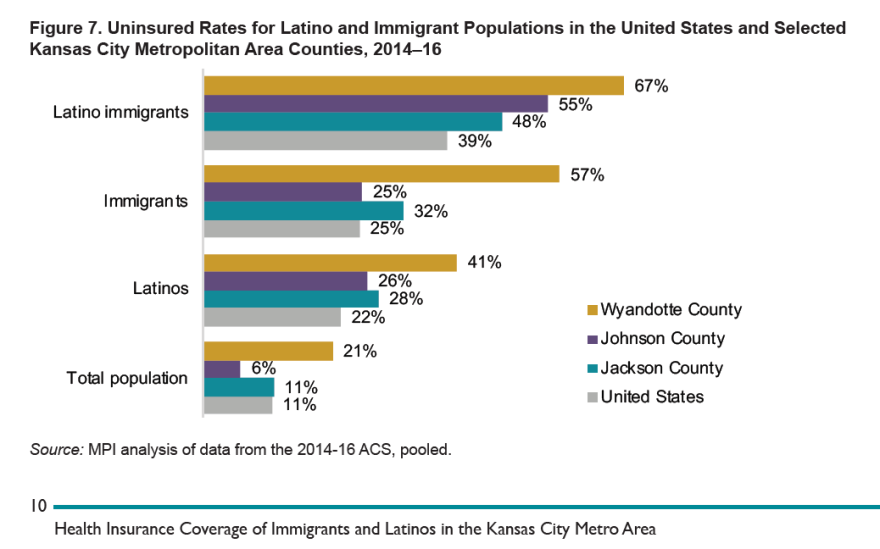Immigrants and U.S.-born Latinos account for more than a third of residents without health insurance in the Kansas City area’s three largest counties.
That’s one of the findings in a study about the fastest growing segment of the local workforce, commissioned by the Reach Healthcare Foundation.
Drawing on Census Bureau and other data, the study found that 61,000 Latinos and immigrants, representing 38% of the uninsured population in Jackson, Johnson and Wyandotte counties, lack health insurance.
“Obviously, these are populations that matter in terms of the healthcare system,” says Randy Capps, director of research for U.S. programs with the Migration Policy Institute and co-author of the study. “They’re a population that leans heavily on the healthcare safety net here.”
While healthcare coverage in general has improved since the Affordable Care Act took effect five years ago, Capps says progress has stalled, particularly in Kansas and Missouri, both of which have failed to expand Medicaid.
Medicaid expansion would extend coverage to about 44,000 of the uninsured residents in the three-county area, including an estimated 9,000 Latinos and 8,000 legal immigrants, according to the study.
“When you have a situation where you have uninsured people – people who may get sicker than they otherwise would because they don’t have access to primary and preventive care – that creates a burden on the healthcare industry if they show up later on in emergency rooms when they’re sicker,” Capps says. “It also means they’re less productive in the workforce.”
Jackson, Wyandotte and Johnson counties are home to about 150,000 Latinos, most of them born in the United States, and about 115,000 immigrants (the two categories overlap), slightly less than half of whom identify as Latino.
In Wyandotte County, 41% of Latinos and 57% of immigrants were uninsured between 2014 and 2016, according to the MPI study. That compares with 21% for the county population as a whole.
In Jackson County, the uninsurance rates for the two groups were somewhat better – 28% and 32%, respectively – compared with 11% for the county as a whole.
In Johnson County, the rates were 26% and 25% compared with 11% countywide.

Capps says one of the surprising findings of the study was that there are almost as many uninsured Latino immigrants in Johnson County as there are in Wyandotte County.
“They’re just more scattered and probably less visible (in Johnson County),” he says.
That, he says, could make it more difficult for them to access community-based health services than their counterparts in Jackson and Wyandotte counties, who are concentrated in fewer neighborhoods.
That’s why “it’s really important to shore up that safety net for the uninsured,” Capp says. “That means investing in federally qualified community health centers, the hospitals that will serve the uninsured and public health clinics, and making sure they have the kind of financial base and also the geographic location, presence and staffing to serve this uninsured population going forward.”
Mariana Ramirez, director of the Juntos Center for Advancing Latino Health in Kansas City, Kansas, says that cost remains the principal barrier to coverage for the groups in the study.
“Many people are struggling to cover their employment-based premiums and copays and sometimes they’re giving up coverage because they cannot afford it,” she says. “And other times it’s just not an option because their employers don’t offer (health insurance).”
Juntos, which works with the University of Kansas Medical Center to eliminate health disparities in under-served Latino communities, worked with the Migration Policy Institute to examine health insurance coverage among Latinos and immigrants in the three-county area.
Ramirez says that while the Affordable Care Act was a “big benefit” for the area’s Latino population, “we heard stories from some families who are struggling to make the payments and they’re still not able to get the services they need because they have restricted (healthcare provider) networks that they can use.”
“The plans change every year,” she says, “and they cannot see the providers that they need.”
Capps and Ramirez argue that promoting the health and productivity of the Latino and immigrant populations is crucial from an economic development standpoint, since they represent the fastest growing share of the local workforce.
“Given the important role immigrants and their U.S.-born children play in Kansas City-area communities and the future of the regional economy, it makes economic sense to maximize health insurance coverage for immigrant and Latino families,” Capps says.
“But because those who do not obtain health-care coverage will likely continue to rely on safety-net providers, it will remain important to ensure continued public and private support for these institutions.”
Dan Margolies is a senior reporter and editor at KCUR. You can reach him on Twitter @DanMargolies.



